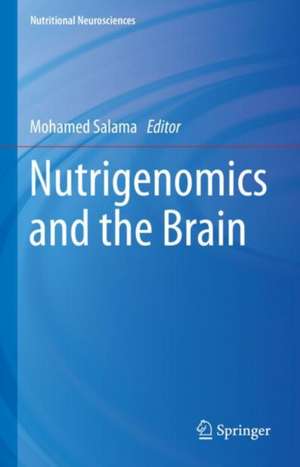Nutrigenomics and the Brain: Nutritional Neurosciences
Editat de Mohamed Salamaen Limba Engleză Hardback – 21 iun 2022
| Toate formatele și edițiile | Preț | Express |
|---|---|---|
| Paperback (1) | 1031.89 lei 38-44 zile | |
| Springer Nature Singapore – 22 iun 2023 | 1031.89 lei 38-44 zile | |
| Hardback (1) | 1041.36 lei 38-44 zile | |
| Springer Nature Singapore – 21 iun 2022 | 1041.36 lei 38-44 zile |
Preț: 1041.36 lei
Preț vechi: 1370.21 lei
-24% Nou
Puncte Express: 1562
Preț estimativ în valută:
199.36€ • 208.01$ • 167.11£
199.36€ • 208.01$ • 167.11£
Carte tipărită la comandă
Livrare economică 08-14 martie
Preluare comenzi: 021 569.72.76
Specificații
ISBN-13: 9789811692048
ISBN-10: 9811692041
Pagini: 234
Ilustrații: VII, 234 p. 1 illus.
Dimensiuni: 155 x 235 mm
Greutate: 0.5 kg
Ediția:1st ed. 2022
Editura: Springer Nature Singapore
Colecția Springer
Seria Nutritional Neurosciences
Locul publicării:Singapore, Singapore
ISBN-10: 9811692041
Pagini: 234
Ilustrații: VII, 234 p. 1 illus.
Dimensiuni: 155 x 235 mm
Greutate: 0.5 kg
Ediția:1st ed. 2022
Editura: Springer Nature Singapore
Colecția Springer
Seria Nutritional Neurosciences
Locul publicării:Singapore, Singapore
Cuprins
Chapter 1. Nutrigenomics; a broader concept.- Chapter 2. Gene-environment interaction.- Chapter 3. Gene-gut-brain - axis (gene–based personalized medicine).- Chapter 4. Nutrigenomics of aging.- Chapter 5. Nutrigenomics and Mental health.- Chapter 6. Nutrigenomics and neurodevelopmental disorders.- Chapter 7. Nutrigenomics and Alzheimer’s disease.- Chapter 8. Nutrigenomics and Parkinson’s Disease.- Chapter 9. Nutrigenomics, nutrigenetics and big data.- Chapter 10. Nutrigenomics and Development.- Chapter 11. Early Child malnutrition and neurodevelopment.- Chapter 12. The emerging role of vit D deficiency and Parkinson’s Disease risk.- Chapter 13. Nutrigenomics and autophagy crosstalk.- Chapter 14. Nanoparticles in food additives and brain health.
Notă biografică
Dr. Mohammed Salama is Atlantic senior fellow for Equity in brain health at the Global Brain Health Institute (GBHI) and Associate professor at the Institute of Global Health and Human Ecology at the American University in Cairo (AUC). He established the first Translational Neuroscience Unit in Egypt. Mohamed’s collaborative research led to establishing the Egyptian Network for Neurodegenerative Disorders Mohamed was selected as a SOT Global Senior Scholar in 2013 and Translational/bridging awardee in 2016. He was awarded by Parkinson’s and Movement Disorders Foundation (PMDF) for his continued research in neurodegeneration. Recently, Mohamed and his colleagues succeeded in drafting the first Reference Egyptian Genome and collaborating with other colleagues to start a national cohort (A Longitudinal Study of Egyptian Health Aging [AL-SEHA]).
Textul de pe ultima copertă
This book highlights the effect of complex interactions between numerous genetic and environmental factors, including food intake, physical activity, age, and stress on brain physiology and function. It further discusses the mechanistic connection between nutrition and aging towards understanding the effect of the brain on longevity. The book also reviews the efficiency of nutraceutical compounds for treating and preventing of neurodevelopmental and neurodegenerative disorders. It also discusses the role of gut microbiota on the gut-brain axis and presents the role of nutrition in neurological inflammatory diseases.
Caracteristici
Present the role of nutrition on brain function and physiology Discusses role of data mining in nutrigenomics Reviews the role of gut microbiota on the gut-brain axis











